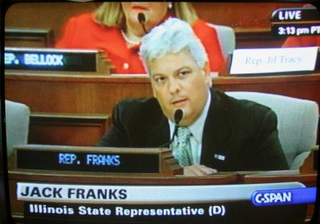Government pension abuses in Illinois have prompted some lawmakers to try to advance legislation to stop labor leaders from cashing in on taxpayers.
The moves come in response to a series of articles by the Chicago Tribune detailing the ways union officials have been able to count their work for their unions toward local and state government pensions worth millions of dollars.
The most egregious abuse arguably involves two Illinois Federation of Teachers lobbyists with no teaching experience who were allowed to substitute-teach one day in 2007 and count their years working for the union as credit in the state Teachers’ Retirement System.
One Day’s Work, $108K Pension
For Steven Preckwinkle, the IFT’s political director, that one day of substitute teaching will qualify him for a government-funded pension starting at $108,000 annually when he retires next year at age 60, according to the Tribune‘s analysis. Teacher pension benefits increase 3 percent annually.
Many lawmakers say they did not know of a provision in state law that allowed the lobbyists to do one day of classroom work and receive years of credit toward a government pension.
State Rep. Jack D. Franks (D-Woodstock) has introduced legislation to rescind the two lobbyists’ ability to participate in the Illinois Teachers’ Retirement System (TRS).
‘Closing Obscene Loophole’
“With this legislation, we are closing an obscene loophole that harms
Illinois’ hardworking teachers,” said Franks. “This type of all-too-familiar insider gamesmanship has contributed to the widespread demonization of our public sector employees and has put Illinois’ retirement systems further into debt.”
Franks called upon Preckwinkle and fellow IFT lobbyist David Piccioli to resign their positions with the IFT.
“These individuals have a fiduciary obligation to protect their members’ retirement benefits, but instead did just the opposite,” Franks said. “They self-dealt for their own interests and harmed their members. Springfield bears its share of the blame for creating openings like this, but when the only two people to take advantage of the situation are IFT lobbyists deeply involved with crafting the legislation, this is inexcusable.”
In a statement on its Web site, the IFT defended the lobbyists’ action by saying it was legal and added, “The Tribune story specifically mentions IFT staff and the pensions they are legally eligible to receive in the Teachers Retirement System (TRS). That isolated opportunity for union staff to purchase past pension credit isn’t legal anymore and it should never be allowed again. The IFT would oppose any provision to revive that practice. The law should also be changed to prevent any future union employees from receiving pension credit from TRS without substantial time teaching in the classroom.”
Chicago Double Dipping
Meanwhile, House Republican Leader Tom Cross of Oswego hopes to advance legislation that calls for workers employed by labor organizations in Chicago to have retirement contributions based on their regular salary, not the salary received from the union.
Cross is the chief sponsor of House Bill 3813, which would repeal a portion of state law passed in 1991 that allowed Chicago city employees to retire with a city pension that was based on a much higher union salary. This would affect the Chicago Municipal Employees’ Pension Fund, Chicago Laborers’ Pension Fund, and the Chicago Teachers’ Pension Fund. The change would allow future union officials to accept a city pension based on their city salary when they left service.
As amended, HB3813 would also ensure union officials cannot collect two pensions, one through the City of Chicago and one through a labor organization, by earning pension credit in both pension funds for the same period of service. This would affect the Chicago Municipal Employees’ Pension Fund and Chicago Laborers’ Pension Fund.
‘Outrageous Stories’
“This summer, Chicago media outlets uncovered some outrageous stories about Chicago city employees taking huge pension bumps, dipping into multiple pension funds for the same service, and engaging in fraud,” said Cross.
“We are attempting to make our state laws stronger to prevent government employees from dipping into taxpayers’ pockets to take more than they have earned,” he added.
The bill was sent to the full House for consideration at the end of October.


